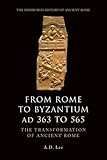From Rome to Byzantium AD 363 to 565 : The Transformation of Ancient Rome / A. D. Lee.
Material type: TextSeries: The Edinburgh History of Ancient Rome : EHARPublisher: Edinburgh : Edinburgh University Press, [2022]Copyright date: ©2013Description: 1 online resource (360 p.) : 40 B/W illustrations 10 MapsContent type:
TextSeries: The Edinburgh History of Ancient Rome : EHARPublisher: Edinburgh : Edinburgh University Press, [2022]Copyright date: ©2013Description: 1 online resource (360 p.) : 40 B/W illustrations 10 MapsContent type: - 9780748627905
- 9780748631759
- DG311 .L44 2013
- online - DeGruyter
| Item type | Current library | Call number | URL | Status | Notes | Barcode | |
|---|---|---|---|---|---|---|---|
 eBook
eBook
|
Biblioteca "Angelicum" Pont. Univ. S.Tommaso d'Aquino Nuvola online | online - DeGruyter (Browse shelf(Opens below)) | Online access | Not for loan (Accesso limitato) | Accesso per gli utenti autorizzati / Access for authorized users | (dgr)9780748631759 |
Frontmatter -- Contents -- Maps -- Illustrations -- Series editor’s preface -- Author’s preface -- Acknowledgements -- Abbreviations -- CHAPTER 1 The Constantinian inheritance -- Part I The later fourth century -- CHAPTER 2 Emperors, usurpers and frontiers -- CHAPTER 3 Towards a Christian empire -- CHAPTER 4 Old Rome, new Rome -- Part II The long fifth century -- CHAPTER 5 Generalissimos and imperial courts -- CHAPTER 6 Barbarians and Romans -- CHAPTER 7 Church and state, piety and power -- CHAPTER 8 Anastasius and the resurrection of imperial power -- CHAPTER 9 Rome’s heirs in the west -- Part III Longer-term trends -- CHAPTER 10 Urban continuity and change -- CHAPTER 11 Economic patterns -- Part IV The age of Justinian -- CHAPTER 12 Justinian and the Roman past -- CHAPTER 13 Justinian and the Christian present -- CHAPTER 14 Justinian and the end of antiquity -- Chronology -- Lists of rulers -- List of bishops of Rome -- Guide to further reading -- Select bibliography of modern works -- Index
restricted access online access with authorization star
http://purl.org/coar/access_right/c_16ec
Between the deaths of the Emperors Julian (363) and Justinian (565), the Roman Empire underwent momentous changes. Most obviously, control of the west was lost to barbarian groups during the fifth century, and although parts were recovered by Justinian, the empire's centre of gravity shifted irrevocably to the east, with its focal point now the city of Constantinople. Equally important was the increasing dominance of Christianity not only in religious life, but also in politics, society and culture. Doug Lee charts these and other significant developments which contributed to the transformation of ancient Rome and its empire into Byzantium and the early medieval west. By emphasising the resilience of the east during late antiquity and the continuing vitality of urban life and the economy, this volume offers an alternative perspective to the traditional paradigm of decline and fall.Key features:• Provides a clear analytical narrative of pivotal political, military, and religious developments• Complements this with an examination of overarching trends in urban life and the economy• Gives particular attention to the dynamics of political and religious power and of Roman-barbarian relations during the fifth century
Mode of access: Internet via World Wide Web.
In English.
Description based on online resource; title from PDF title page (publisher's Web site, viewed 29. Jun 2022)


